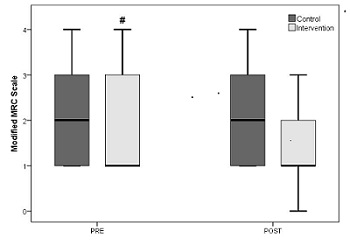Abstract
OBJECTIVES: To evaluate the effect of MBI program on dyspnea and quality of life in a group of patients with ILDs. METHODS: Prospective study involving 84 patients diagnosed with ILDs and assisted at the UFMG University Hospital. The intervention group (IG: n=57) participated in the 8 weeks MBI via Google Meet platform. On Week 1, both groups [(IG and control group (CG)] received information about a healthy lifestyle. All participants were asked to fill out a package of questionnaires on week 1, including the dyspnea, mMRC, Leicester cough, K-BILD and DASS-21questionnaires. All participants were also asked to fill out the same questionnaires at the end of the 8 weeks. All analysis were conducted on an intention-to-treat basis using the Generalized Estimating Equations (GEE). RESULTS: The IG presented a reduction in the median of dyspnea according to the mMRC scale (p=0.003) (Fgure 1), as well as a significant increase in the total Liscester score: (p=0.038). The DASS-21 showed a significant reduction in the depression, anxiety, and stress domains. Depression: p=0.029. Anxiety: p=0.025. Stress: p=0.026. CONCLUSION: Mindfulness-Based Interventions can improve quality of life, with reduction in dyspnea, the impact of coughing and psychological symptoms in patients with ILDs.
